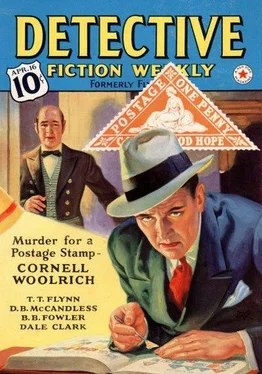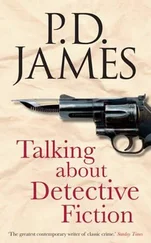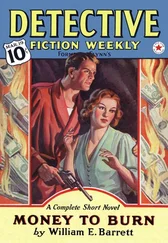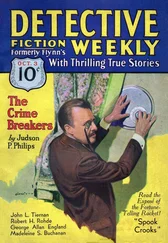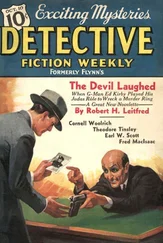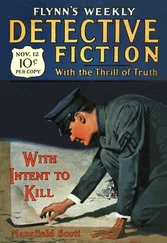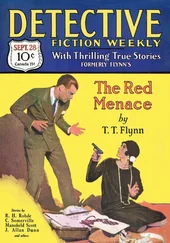Лоуренс Трит - Detective Fiction Weekly. Vol. 118, No. 6, April 16, 1938
Здесь есть возможность читать онлайн «Лоуренс Трит - Detective Fiction Weekly. Vol. 118, No. 6, April 16, 1938» весь текст электронной книги совершенно бесплатно (целиком полную версию без сокращений). В некоторых случаях можно слушать аудио, скачать через торрент в формате fb2 и присутствует краткое содержание. Город: New York, Год выпуска: 1938, Издательство: The Red Star News Company, Жанр: Детектив, на английском языке. Описание произведения, (предисловие) а так же отзывы посетителей доступны на портале библиотеки ЛибКат.
- Название:Detective Fiction Weekly. Vol. 118, No. 6, April 16, 1938
- Автор:
- Издательство:The Red Star News Company
- Жанр:
- Год:1938
- Город:New York
- ISBN:нет данных
- Рейтинг книги:3 / 5. Голосов: 1
-
Избранное:Добавить в избранное
- Отзывы:
-
Ваша оценка:
- 60
- 1
- 2
- 3
- 4
- 5
Detective Fiction Weekly. Vol. 118, No. 6, April 16, 1938: краткое содержание, описание и аннотация
Предлагаем к чтению аннотацию, описание, краткое содержание или предисловие (зависит от того, что написал сам автор книги «Detective Fiction Weekly. Vol. 118, No. 6, April 16, 1938»). Если вы не нашли необходимую информацию о книге — напишите в комментариях, мы постараемся отыскать её.
Detective Fiction Weekly. Vol. 118, No. 6, April 16, 1938 — читать онлайн бесплатно полную книгу (весь текст) целиком
Ниже представлен текст книги, разбитый по страницам. Система сохранения места последней прочитанной страницы, позволяет с удобством читать онлайн бесплатно книгу «Detective Fiction Weekly. Vol. 118, No. 6, April 16, 1938», без необходимости каждый раз заново искать на чём Вы остановились. Поставьте закладку, и сможете в любой момент перейти на страницу, на которой закончили чтение.
Интервал:
Закладка:
“Yeah, this is 215 Rainier Street, but there’s no Foster here and never has been. I been living in this house five years and I ought to know. Somebody’s been kidding you.” Congenitally suspicious, she shifted the burden of responsibility to her husband’s shoulders, though Hobart had made no move to force his way in. “Max, come here a minute, talk to him, will ya?”
The man of the house, as is often the case, was a little less hostile, but no more helpful than she had been. “No,” he said in answer to Hobart’s perplexed question, “nobody along this street has called the police in. There ain’t no trouble around here, as far as I know.”
Hobart shook his head. “A fine thing, dragging me out of the house on a fool’s errand like this! It couldn’t have been a practical joke, because I don’t know anyone who would—” He broke off. “May I use your phone a minute? I’ll pay you for the call. Maybe I can reach him through headquarters.”
The woman quickly forestalled this, in a loud stage-whisper. “No, don’t let him in here! You don’t know who he is or what he’s after!”
The man looked a little embarrassed, but refused. “You better try a drug store.”
Hobart, who could have bought the whole house and the ground it stood on out of his cigarette money, turned away fuming at the boorishness of these people, and strode back to his car. Before he could start off, however, the door reopened and the man called out to him:
“Hey! I just thought of it! Are you sure he said street, Rainier Street?”
He hadn’t, now that Hobart thought of it. He’d just said Rainier, without any further designation.
“Because I just remembered, there’s a Rainier Parkway too, way out on the other side of town. Our mail gets mixed up sometimes. He mighta meant that.”
He gave Hobart a few sketchy directions, and later on Hobart amplified them from another motorist. His annoyance evaporated before long. As long as he was out and in the car, it seemed childish not to try his luck at the second address before turning home. If the inspector was a real inspector and the case was on the level, it gave promise of being inordinately interesting. Anything concerning stamps was interesting to Hobart. Their collection was a fetish to him. They took more time than his business.
II
But the twenty minutes had nearly tripled themselves before he finally reached his new destination. This Parkway with the plagiarized name (or maybe it was the other way around) ran through a far superior residential section than had the first. All the residences along it were set in ample grounds. Some of the estates comprised entire square blocks. Two-fifteen was among the latter. It was a house a good deal like his own, but on an even larger scale. There were two cars standing out in front of it, and when he went up the front walk a heretofore invisible figure detached itself from behind one of the veranda columns and became a uniformed patrolman barring his way.
“An Inspector Foster in there?” asked Hobart.
“Oh yeah? You Mr. Hobart? He’s waiting for you. Go right in.” The cop even opened the front door and accommodatingly held it for Hobart to go through.
The hallway was lighted but empty. Up above somewhere, at the top of a spacious, curving white-painted staircase, came a sound of feminine sobbing pitched in a low, exhausted key, as though it had been going on for hours. A voice with a Negroid drawl to it was coaxing, “Drink his tea now, honey. Come on, drink it for Beulah.”
A tiny white thing on the carpet became, to Hobart’s keen and almost microscopic eyes, a rose petal. Another, more waxlike, he identified as a gardenia petal. A noticeable aroma of flowers and pungent greenery clung to the air. The funeral, evidently, had already taken place. He was glad of that. He was not an amateur criminologist, had no hankering to stare corpses in the face, or even be under the same roof with them for any length of time. He was a philatelist.
He turned in at the brightly lighted, double doorway ahead, and entered a room where there were three men. One was busy at a large open secretary reading through a stack of old correspondence, item by item. A second was seated at a table, with a number of thick albums before him. They were about two feet square, gilt-edged, with expensive hand-tooled leather bindings and the initials A.H. embossed on each. He was slowly turning the pages of one with the perfectly blank look of a man looking at something he doesn’t understand. The third was doing nothing but sitting in an easy chair, smoking, with his legs crossed, as though waiting for something.
Hobart said, “Inspector Foster?” to the man engaged with the stamp albums.
The idler in the chair, who was younger and far less identifiable as a police officer, got up and came toward him. “I’m Foster. We were just beginning to wonder whether—”
Hobart said, clasping the offered hand, “Sorry I took so long, but I went to the wrong address first. I darned near gave up then and there,” he added, as a gentle hint that he wasn’t merely an errand boy used to chasing around at people’s behest, and that they should be glad he’d come at all.
Foster looked genuinely remorseful. “I wouldn’t have had that happen for the world! We did the same thing ourselves last night when we first answered the call. I should have been more explicit, but we’ve been working like dogs all day and I guess in my hurry it slipped my mind.”
“That when it happened, last night?”
“Yes, sometime between nine and midnight.” Foster introduced his two teammates. “This is Broderick, and this is Timmins, Mr. Hobart. Sit down, won’t you? Now first I’d better tell you what we’ve gotten so far.” At this point, Hobart noticed, the one called Broderick curved his index finger around so that it met the point of his thumb evidently suggesting a zero. Foster went on. “This man Aaron Harding—”
“That the murdered party?” Hobart hadn’t even known whose house he was in until now.
“Yes, a very wealthy man. Realtor by profession and, like yourself, an ardent stamp-collector on the side. As a matter of fact his collecting activities were taking up more of his time than his legitimate business. He was getting on in years, had made his pile two or three times over, and figure J he was entitled to a little relaxation, I suppose. That’s neither here nor there. He was a widower and lived here alone with just a darky couple, man and wife, cook and chauffeur. Well, they had some revival meeting or chicken fry or whatnot to go to last night, and he gave them both the night off, and stayed here alone. When they left at nine he was sitting in this same chair you’re in now.”
Hobart looked down at the chair with a layman’s typical queasiness, but remained where he was. To the detective mind, evidently, it didn’t even occur that such a trivial coincidence could make anyone uncomfortable.
Foster went on: “He had his stamp looks spread out around him. When they came back at twelve and the woman looked in to see if he’d like any refreshment, he was still in the same chair, stamp books spread out around him, but — he’d been smothered to death by a handkerchief being pressed tight over his mouth and nose until his heart had stopped beating. We figured that from bits of lint found on his lips and nostrils.”
Hobart blew out his breath to dispel the repugnance the recital had evoked. “Shouldn’t the handkerchief give you a clue?” he ventured finally. “I’ve heard you people are very clever about things like—”
“It was his own,” said the detective ruefully. “Here’s how we’ve reconstructed it, with the little we have to go by. He admitted the person himself. He must have. There are no signs of forcible entry anywhere around the house. We don’t believe the person was known to him by sight, and we’re positive he wasn’t expected. Harding would have mentioned he was coming to the darkies, and he didn’t. But this man somehow gained Harding’s confidence out there at the door and was led in here to view the collection. Possibly he pretended to have stamps to offer for sale. The old man reseated himself, sneezed as he did so, from the effects of going to the open door the way he just had, took out his handkerchief, and the other stepped quickly behind him, applied pressure, and kept on applying pressure until the suffocated old man was gone. Then the intruder left, without taking anything, without disturbing anything, without leaving a clue behind. No fingerprints on anything — tabletop, chair, doorknob, or the covers of the albums themselves. Obviously gloved.”
Читать дальшеИнтервал:
Закладка:
Похожие книги на «Detective Fiction Weekly. Vol. 118, No. 6, April 16, 1938»
Представляем Вашему вниманию похожие книги на «Detective Fiction Weekly. Vol. 118, No. 6, April 16, 1938» списком для выбора. Мы отобрали схожую по названию и смыслу литературу в надежде предоставить читателям больше вариантов отыскать новые, интересные, ещё непрочитанные произведения.
Обсуждение, отзывы о книге «Detective Fiction Weekly. Vol. 118, No. 6, April 16, 1938» и просто собственные мнения читателей. Оставьте ваши комментарии, напишите, что Вы думаете о произведении, его смысле или главных героях. Укажите что конкретно понравилось, а что нет, и почему Вы так считаете.
